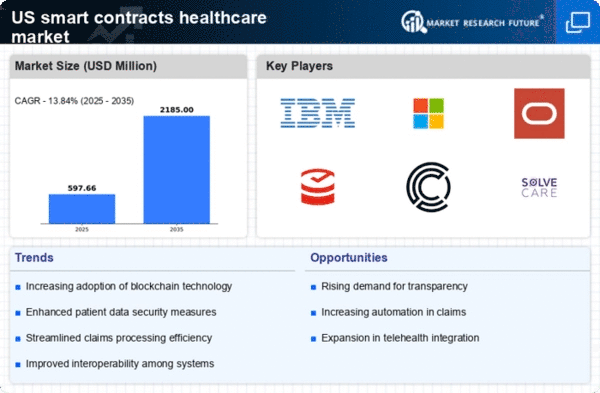Cost Reduction Initiatives
Cost reduction initiatives are significantly influencing the smart contracts-healthcare market. Healthcare organizations are under constant pressure to lower operational costs while maintaining high-quality care. Smart contracts can automate various administrative tasks, such as claims processing and billing, which traditionally require substantial manual effort. By reducing administrative overhead, organizations can potentially save up to 20% on operational costs. This financial incentive is driving the adoption of smart contracts, as stakeholders recognize the long-term benefits of investing in technology that enhances efficiency and reduces waste. Consequently, the smart contracts-healthcare market is likely to see increased investment as organizations prioritize cost-effective solutions.
Patient-Centric Care Models
The shift towards patient-centric care models is reshaping the smart contracts-healthcare market. As healthcare providers focus on improving patient engagement and satisfaction, smart contracts offer innovative solutions to enhance the patient experience. By enabling secure and transparent transactions, these contracts can empower patients to have greater control over their health data. This trend aligns with the growing demand for personalized healthcare services, which is projected to reach $2 T by 2025. The integration of smart contracts into patient care processes can facilitate better communication between patients and providers, ultimately leading to improved health outcomes and driving growth in the smart contracts-healthcare market.
Increased Investment in Health IT
Increased investment in health IT is a pivotal driver for the smart contracts-healthcare market. As healthcare organizations recognize the importance of technology in improving operational efficiency, funding for health IT solutions has surged. In 2025, health IT investments are expected to exceed $200 B in the US. Smart contracts, as a component of this investment, are gaining traction due to their potential to streamline processes and enhance data security. This influx of capital is likely to accelerate the development and implementation of smart contract solutions, positioning the smart contracts-healthcare market for substantial growth in the coming years.
Enhanced Interoperability Solutions
The smart contracts-healthcare market is experiencing a notable push towards enhanced interoperability solutions. This trend is driven by the need for seamless data exchange among various healthcare systems. As healthcare providers increasingly adopt electronic health records (EHRs), the integration of smart contracts can facilitate real-time data sharing, thereby improving patient outcomes. According to recent estimates, interoperability issues cost the US healthcare system approximately $30 B annually. By leveraging smart contracts, stakeholders can automate data verification processes, ensuring that patient information is accurate and readily accessible. This capability not only enhances operational efficiency but also fosters trust among patients and providers, ultimately driving growth in the smart contracts-healthcare market.
Regulatory Compliance and Standardization
Regulatory compliance remains a critical driver in the smart contracts-healthcare market. As healthcare regulations evolve, organizations are compelled to adopt solutions that ensure adherence to standards such as HIPAA and HITECH. Smart contracts can automate compliance processes, reducing the risk of human error and potential penalties. The market is projected to grow as healthcare entities seek to mitigate compliance risks, with estimates suggesting that non-compliance can lead to fines exceeding $1 M per incident. By integrating smart contracts, healthcare organizations can streamline their compliance efforts, thereby enhancing their operational resilience and fostering a more secure environment for patient data.
















